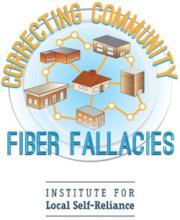Fast, affordable Internet access for all.
misinformation
Content tagged with "misinformation"
Correcting Community Fiber Fallacies: Attacks on LUS Fiber
Correcting Community Fiber Fallacies: Attacks on LUS Fiber
Correcting Community Fiber Fallacies: Attacks on LUS Fiber
Correcting Community Fiber Fallacies: Attacks on LUS Fiber
Correcting Community Fiber Fallacies: Attacks on LUS Fiber
FreeUTOPIA Destroying Myths About Macquerie in Utah
Jesse Harris at FreeUTOPIA recently published a piece correcting the many fantastic errors disseminated by the Utah Taxpayers Association. The group continues to spread lies to poison a proposal from Australian company Macquarie that could reinvigorate the ailing network. We spoke with Harris and Pete Ashdown, from Xmission, about the proposal in episode #85 of the Community Broadband Bits podcast.
As can be expected, the arguments are nothing new, but the Utah Taxpayers Association still finds a way to take it to new extremes. Harris' post is worth the read because it offers truths to correct misinformation.
After correcting several points, Harris writes:
Really, their diatribe just goes on and on like that. A lot of it is basic fact-checking stuff that’s flat-out wrong, but they know those kinds of statements will rile people up and get them too angry to consider the real facts.
The best thing you can do right now is to make sure you show up at city council meetings, let your elected officials know you support the deal, and make sure you counter any of the flat-out false talking points the opposition will be trotting out time and time again. We’re really close to having this thing in the bag, and we can’t let up until the ink dries on the final agreement.
In a late-breaking story, he also says he has evidence that CenturyLink is behind this astroturf campaign. Not at surprising, but we should not sit idly by while powerful corporations try to undermine our republic.
FreeUTOPIA Destroying Myths About Macquerie in Utah
Jesse Harris at FreeUTOPIA recently published a piece correcting the many fantastic errors disseminated by the Utah Taxpayers Association. The group continues to spread lies to poison a proposal from Australian company Macquarie that could reinvigorate the ailing network. We spoke with Harris and Pete Ashdown, from Xmission, about the proposal in episode #85 of the Community Broadband Bits podcast.
As can be expected, the arguments are nothing new, but the Utah Taxpayers Association still finds a way to take it to new extremes. Harris' post is worth the read because it offers truths to correct misinformation.
After correcting several points, Harris writes:
Really, their diatribe just goes on and on like that. A lot of it is basic fact-checking stuff that’s flat-out wrong, but they know those kinds of statements will rile people up and get them too angry to consider the real facts.
The best thing you can do right now is to make sure you show up at city council meetings, let your elected officials know you support the deal, and make sure you counter any of the flat-out false talking points the opposition will be trotting out time and time again. We’re really close to having this thing in the bag, and we can’t let up until the ink dries on the final agreement.
In a late-breaking story, he also says he has evidence that CenturyLink is behind this astroturf campaign. Not at surprising, but we should not sit idly by while powerful corporations try to undermine our republic.
FreeUTOPIA Destroying Myths About Macquerie in Utah
Jesse Harris at FreeUTOPIA recently published a piece correcting the many fantastic errors disseminated by the Utah Taxpayers Association. The group continues to spread lies to poison a proposal from Australian company Macquarie that could reinvigorate the ailing network. We spoke with Harris and Pete Ashdown, from Xmission, about the proposal in episode #85 of the Community Broadband Bits podcast.
As can be expected, the arguments are nothing new, but the Utah Taxpayers Association still finds a way to take it to new extremes. Harris' post is worth the read because it offers truths to correct misinformation.
After correcting several points, Harris writes:
Really, their diatribe just goes on and on like that. A lot of it is basic fact-checking stuff that’s flat-out wrong, but they know those kinds of statements will rile people up and get them too angry to consider the real facts.
The best thing you can do right now is to make sure you show up at city council meetings, let your elected officials know you support the deal, and make sure you counter any of the flat-out false talking points the opposition will be trotting out time and time again. We’re really close to having this thing in the bag, and we can’t let up until the ink dries on the final agreement.
In a late-breaking story, he also says he has evidence that CenturyLink is behind this astroturf campaign. Not at surprising, but we should not sit idly by while powerful corporations try to undermine our republic.
FreeUTOPIA Destroying Myths About Macquerie in Utah
Jesse Harris at FreeUTOPIA recently published a piece correcting the many fantastic errors disseminated by the Utah Taxpayers Association. The group continues to spread lies to poison a proposal from Australian company Macquarie that could reinvigorate the ailing network. We spoke with Harris and Pete Ashdown, from Xmission, about the proposal in episode #85 of the Community Broadband Bits podcast.
As can be expected, the arguments are nothing new, but the Utah Taxpayers Association still finds a way to take it to new extremes. Harris' post is worth the read because it offers truths to correct misinformation.
After correcting several points, Harris writes:
Really, their diatribe just goes on and on like that. A lot of it is basic fact-checking stuff that’s flat-out wrong, but they know those kinds of statements will rile people up and get them too angry to consider the real facts.
The best thing you can do right now is to make sure you show up at city council meetings, let your elected officials know you support the deal, and make sure you counter any of the flat-out false talking points the opposition will be trotting out time and time again. We’re really close to having this thing in the bag, and we can’t let up until the ink dries on the final agreement.
In a late-breaking story, he also says he has evidence that CenturyLink is behind this astroturf campaign. Not at surprising, but we should not sit idly by while powerful corporations try to undermine our republic.



